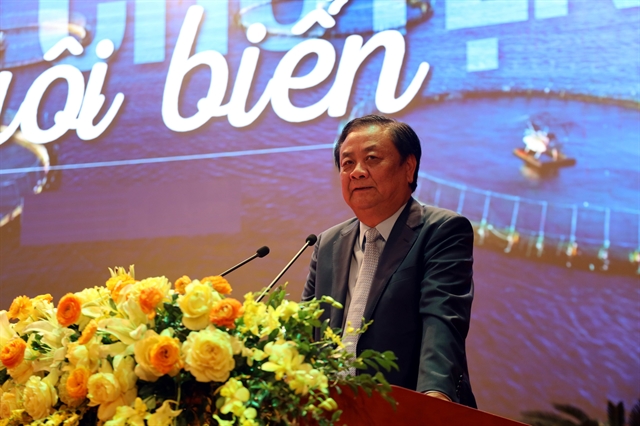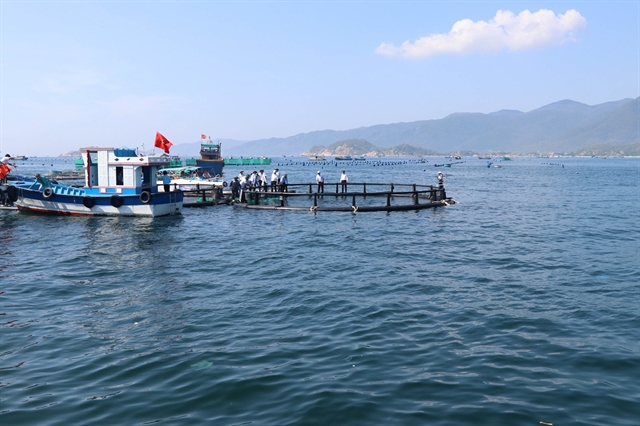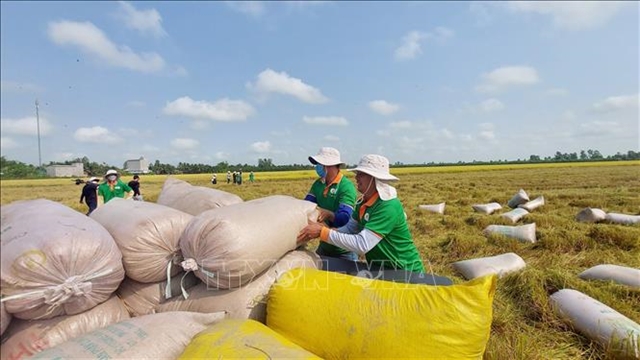 Society
Society


|
| Minister of Agriculture and Rural Development Lê Minh Hoan gives instruction at the conference. — VNA/VNS Photo Hồng Đạt |
HÀ NỘI — Experts agreed that the mariculture must balance human needs and the preservation of marine resources for sustainable development at a conference held Monday in the northeastern province of Quảng Ninh, by the Ministry of Agriculture and Rural Development (MARD) and the provincial People’s Committee.
Speaking at the opening session, Secretary of the Quảng Ninh Provincial Party Committee Nguyễn Xuân Ký said Quảng Ninh is one of the three economic growth locomotives of the Hồng (Red) River Delta region with good socio-economic and transportation infrastructure.
With constant innovation based on economic, social, environmental and security pillars, for nine consecutive years from 2015 to 2023, Quảng Ninh has maintained a gross regional domestic product (GRDP) rate of over 10 per cent, ranking first in the Red River Delta, and third in the northern region.
"Quảng Ninh's perspective is to develop a blue ocean economy, sustainably use marine resources for growth, improve people's livelihoods and ensure the health of the people and the marine ecosystems,” said Ký.
He said the province would develop more to soon become Southeast Asia's leading marine economic centre.
Ký emphasised that the marine economy would be the province's key sector in the near future.
Accordingly, Quảng Ninh's strategy is to make specialised farmers the core of its multi-sectoral approach to achieving added value.
The province will also take advantage of over 20 million visitors annually for local consumption and export, combining aquaculture with high-tech, efficient and sustainable seafood exploitation.
Minister of Agriculture and Rural Development Lê Minh Hoan said that the mariculture industry must solve social problems, creating livelihoods and job opportunities for people.
To achieve this goal, the marine industry needs close connections between central and local specialised management agencies, the business community, international experts, and professional organisations.
With infrastructure and technology synchronisation, Quảng Ninh has formed a marine ecosystem with over 100 cooperatives established within two years.
They have unique models that combine high-tech mariculture with experiential tourism.
Hoan requested that the MARD coordinate with concerned ministries to promote seaweed farming, processing, and other potentials.
It should also focus on expanding research and international cooperation on marine economy, science and technology.

|
| Open sea aquaculture HDPE fish cage farming in Khánh Hoà Province. — VNA/VNS Photo |
Work together
Hilde Solbakken, Norwegian Ambassador to Việt Nam, said that Việt Nam and Norway were countries with strengths in seafood exports.
She confirmed that the most important thing was that the two countries were actively exchanging experiences and bringing each other valuable opportunities.
Cooperation in marine aquaculture and seafood brings economic benefits to both countries and strengthens the relationship between Việt Nam and Norway.
She hoped the different aspects of sustainable mariculture in Norway would inspire Việt Nam.
Long-term exchanges between Việt Nam and Norway in the marine aquaculture industry through projects, training workshops, seminars and conferences will grow the potential of both countries.
Prime Minister Phạm Minh Chính has approved a project to develop marine aquaculture until 2030, with a vision to 2045.
The project targets that by 2025, the marine aquaculture area will reach 280,000ha, with an output of 850,000 tons and an export turnover of US$0.8-1 billion.
By 2030, the marine farming area will reach 300,000ha, output will be 1.45 million tonnes, and export turnover will reach $1.8-2 billion.
Việt Nam’s orientation is to develop marine farming with advanced technology and modern management methods and expand marine aquaculture in coastal areas, offshore waters and onshore.
The country will promote tropical biodiversity by integrating economic and technical resources from the shipbuilding, shipping, and ecosystem engineering industries.
The conference was organised to analyse the current situation of marine farming in the world and the country, deploy marine aquaculture planning and environmental impact assessment, and advocate for appropriate licensing and allocating marine areas for aquaculture in Quảng Ninh.
Việt Nam is bordered on three sides by the sea, offering natural advantages for developing the marine economy and farming.
The Government and the MARD have identified the marine economy as one of the key priorities.
Besides its advantages, the sector faces many limitations, difficulties, and challenges related to policies, science and technology, investment resources, and the issuance of farming area codes to serve sustainable development.
The conference hopes to be a bridge for management agencies, experts, scientists, businesses and individuals to exchange experiences on these challenges. — VNS




